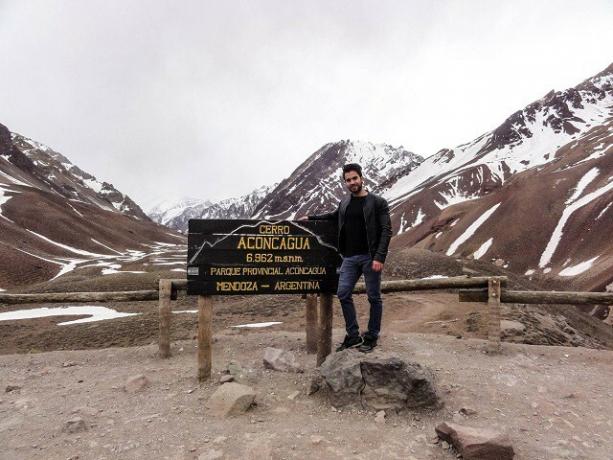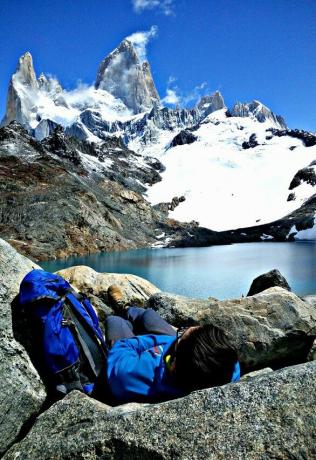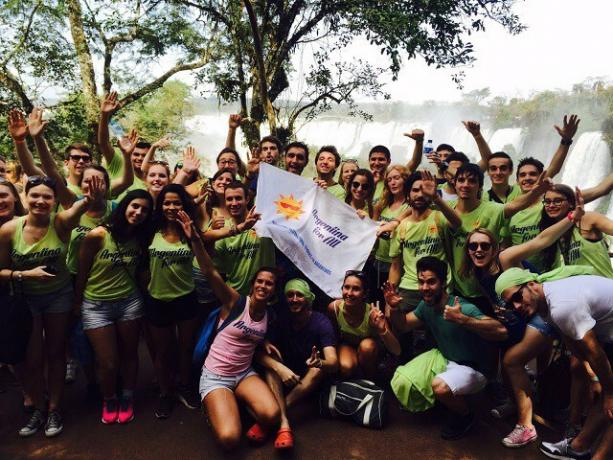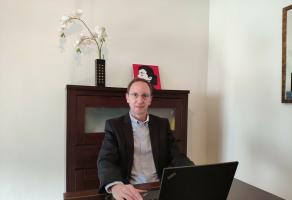Studying Psychology in Argentina: is it a good idea?
The Psychology it is a young science and, as such, its study is still complex. Each faculty of psychology throughout the world prioritizes some theoretical frameworks over others, and the differences between the academic curriculum are notable.
One of the countries with the longest tradition in the study of the human mind is Argentina. The South American nation has a long list of psychologists and psychoanalysts (especially the latter) who have made important contributions to the science of behavior.
Stories of a Spaniard in Buenos Aires
In order to better understand the particularities of the Psychology career in Argentina, we wanted to talk with Daniel Tejedor, who at 21 years of age has had the courage to study psychology both in the University of Valencia (Spain), where he is from, as in the Catholic University of Argentina, thanks to a scholarship that allowed him to learn how this discipline is studied on the other side of the Atlantic.
Interview with Daniel Tejedor
Is it worth studying Psychology in Argentina?
Bertrand Regader: Daniel, how's everything going? We wanted to talk with you to find out about your experience as a Psychology student in two different continents. The first is an obligatory question: as a Valencian by birth, what motivated you to want to travel to Buenos Aires to study the first semester of the fourth year of psychology?
Daniel Tejedor: Before entering the University, I knew that I wanted to do an exchange abroad. I have traveled and studied in other countries before on my own, and they have been by far the greatest experiences of my life. How can I not want to repeat it again, but studying what I like the most?
On the other hand, I must confess that the idea of doing a university exchange came to me in third grade, but because I was too hasty, I could not confirm my enrollment in time. For this reason, in my last year of study I was determined to do it and I had everything studied to make my dream come true.

B.R.: How did you choose your destination? Did you have other countries or universities in your sights?
Well, the truth is that it was a difficult choice. At the University of Valencia we have a large number of destinations to choose from. The first thing I took into account was the language. Most people who do an exchange of these characteristics prioritize the idea of learning a language or improving it. At first I thought about traveling to the USA. But, in my case, since I have previously studied and worked in Anglo-Saxon-speaking countries as I have mentioned, English did not concern me.
Then I considered learning Portuguese or Italian and going to a country where these languages were spoken. After a while, this idea evolved and I realized that since my true passion was psychology, knowing languages was not as important as my training in psychology. Traveling to a foreign country where a language other than your mother tongue is spoken turns out to be an impediment to develop 100% in the field you study (unless you study a philology, for example, or have an interest special).
In this way, I limited my choice to countries where Spanish was spoken. That forced me to travel to Latin America. In Spain, by the way, there are three main types of university exchange, the SICUE Program (between Spanish universities), the Erasmus Program (between European universities) and the International Program (outside Europe). Therefore, the latter was my choice.

B.R.: What Latin American countries did you find the most appealing to go to study Psychology?
In principle, any Latin American country seemed like an interesting option, but of course, I could only choose one. It was then that I began to keep other factors in mind. In Spain (and I think in Europe), Latin American countries have a reputation for being unsafe. In fact, many of my colleagues discard the option of traveling to these countries because they perceive them as very dangerous. For my part, it was something that I took into account, but I was not afraid, so I did the following, I looked for information on statistics of robberies and crimes throughout Latin America, to take it into account.
In addition to this, I also had in mind other factors such as GDP (Gross Domestic Product), the Standard of Living and the Level of Happiness. It may be excessive, but I wanted to base my choice on solid information and not just opinion or television news; because living abroad for so long, without knowing anyone, knowing that I will not see any family member or friend again until I return, more than 10,000 km away... it's like taking it seriously.
Thus, the result was that Argentina (and specifically Buenos Aires), had a good standard of living, a crime and murder rate very low compared to almost all the other countries (although it was still quite higher than in Spain), good universities and many points of interest, both within the capital and outside.
Some points against Argentina were its economic instability and inflation, having a non-violent robbery rate extremely high (especially in Buenos Aires) and its extension (which is 5.5 times larger than Spain, being the eighth largest country biggest in the world). The latter was very important for someone like me, who loves to travel and knew that he was going to travel the whole country, from end to end.

B.R.: You chose the Universidad Católica Argentina as your study center. Why?
To choose the University, I thought first of the countries I was willing to go to. Mainly two, Argentina and Mexico.
At the University of Valencia, when you make the request for the scholarship, they allow you to put five Universities of the country you want. I chose the University of Buenos Aires (UBA), the Catholic University of Argentina (UCA) and the National Autonomous University of Mexico (UNAM), in that order.
Taking into account my academic record, I knew that one of the first three would be granted to me. Mexico, as you can see, was my second country on the list and my third University for various reasons, such as the incredible culture and its fascinating places, but the main reason was for the quality and fame of the UNAM.
To know the ranking of the best universities in Latin America, consult the famous QS University Rankings; that not only informs you about the best Universities, but also about the best cities to live as a university student. In 2015, the UBA, the UCA and the UNAM occupied positions 15, 26 and 6, respectively. As a curiosity, Brazil is the country with the best universities according to this ranking, but as I have already mentioned, I ruled out the option of dedicating my trip to learning languages.

B.R.: You went to Argentina during your fourth year of the degree, as I understand it. What subjects did you take?
First of all, it must be clarified that I went to Argentina to attend the first semester of fourth (I was exactly 171 days). In Spain the career of Psychology is 4 years, and the practices are done in the last. This is why, in addition to taking a certain number of credits in subjects (which had to be validate upon arrival in Spain), I also had to do another number of credits in terms of internships academic.
I took 3 subjects and participated in 4 different university practices. The subjects were: Philosophy and Psychology Seminar, Psychoanalysis and Research Methodology.
On the other hand, the practices were at the J. Rail; at the Italian Hospital in Buenos Aires (where I did two different ones) and at the Instituto Psicoanalitico Mayutica in Buenos Aires.

B.R.: I suppose that the differences in the way of teaching psychology were notable compared to your previous stage, in Valencia. Did you appreciate this in the subjects you took, and in general in the mentality of teachers and students?
The general methodology is very similar. Lectures supported by the teacher's slides, one or more group assignments per subject with their respective exhibition, compulsory attendance (you need to attend a minimum of 70% of the classes and if you want to travel it is a trouble)... As for the subjects, I prefer to analyze them one by one, because I experienced them quite differently.
First of all, I must clarify in passing, one of the great reasons why I chose Argentina for this adventure, and it is the importance of the psychoanalytic movement, both academically and cultural. There a large part of the population has their own psychologist (usually a psychoanalyst), since in fact, Argentina is the country with the most psychologists per capita of the world.
B.R.: You noticed the special influence of Psychoanalysis.

Yes, of course. From my point of view, Psychoanalysis, especially its latest contributions, where the classic dogmatism imposed by authors such as Freud o Lacan, is essential to train a good psychotherapist. That is why I chose Argentina, a place where I can train in orthodox psychoanalysis, from which I must leave, to build a solid base in order to know the most current currents psychoanalytic. Ah! In case I have not said it, at the University of Valencia, and in almost all the Universities of Spain, there is no psychoanalysis course, hence my interest.
That said, studying Psychoanalysis at the UCA allowed me to learn quite broadly all of Freud's teachings that I consider fundamental, even though some need to be updated, because they allow you to see where this great current. Although, I must admit, it was a really difficult subject, and it was also the one that I dedicated the most time to.
Research Methods turned out, I must admit, to be very easy. I took it because I had to validate it with a similar subject at my university in Spain. The difference is that in Europe, the training that psychologists receive in Statistics and Psychometry is colossal compared to what is imparted in Latin America (generally). Moreover, the subject of statistics as such, was formerly at the UCA in the first year of race, and they changed it to third or fourth, because people saw it too difficult and race. In Spain the latter is also common, people are surprised to see numbers in psychology, but a university does not allow changing the order of the subjects because of this; especially Statistics, which is essential to understand research in Psychology.
As for the Seminar of Psychology and Philosophy, it was a point of view different from any other it had had before. A point where philosophy and psychology come together to address issues in a thoughtful and holistic way. Topics such as love, freedom, happiness and power were openly debated in class by all the students. In addition, this seminar was also attended by people from other careers, so it was truly stimulating to hear opinions from all areas of knowledge.
B.R.: Focusing now on the practices that you mentioned that you did, what can you tell us about them?
The practices were a great boost for my training. It was something that I had in mind when I chose the International Program, instead of the Erasmus. While in PI it is allowed to do an internship, in the conventional Erasmus * it is not. In addition, curricularly speaking, having done an internship in a foreign country is a great incentive.
In this sense, in Buenos Aires I had no problem doing them. The university made the procedures much easier for me and did not cause me any problems at any time. This is, in fact, one of the great bureaucratic differences that I have encountered in Argentina. While in Spain the bureaucracy is slow and serious, in Argentina it is infinitely slower still, but more flexible. This allows you to delay or rectify paperwork issues, because everyone gives you things late, but, at least, they are aware of how it works, they take it into account and they do not bother you.
While in Spain, to access an internship, you need certificates, supporting documents, periodic follow-ups, signatures from everyone and a thousand other things; in Argentina the same day that I communicated that I was interested in an internship, they assured me that I could do it, they told me where and when to start, and that same day I started.
Without wanting to elaborate further on this point, I will summarize that, in the practices of the J. Borda, I was working in a therapy group with patients with psychotic disorders, with whom I had direct contact, something very difficult to access in Spain. We did weekly sessions and I was able to witness the havoc that these disorders cause and the joy that their improvement brings.
At the Italian Hospital, in the department of psychiatric pediatrics, I attended lectures on research done by doctors at this hospital, while discussing their results and implications. I also participated in a case supervision group, where psychologists and psychiatrists from the hospital shared the more difficult cases they were handling, in order to seek advice and guidance from the rest of the team we conformed.
Finally, at the Institución Psicoanalítica Mayutica de Buenos Aires, I attended some lectures on childhood phobias from Lacanian psychoanalysis, where we discussed some of their seminars.
B.R.: As much as Psychoanalysis has a wide acceptance among professionals there, I am sure that they have an open and up-to-date mentality.
Of course, it is obvious that we cannot continue to have Freud on a pedestal. But this can be applied to all classical authors. To think that the theories based on concrete casuistry from 100 years ago continue to have the same validity today, is a serious error.
I repeat that starting to study the classics is essential, but to hear that there are still psychoanalysts who continue to relate all psychological disorders to sex; or that they over-interpret all the acts of their patients, I think it is outrageous. To this must be added that the importance of neurosciences and cognitive psychology, if in Spain they displace everything else, in Argentina they hardly have a leading role. Both extremes seem open to criticism. It is essential, in my opinion, that a balanced synthesis be achieved between these perspectives.
B.R.: Did you notice a special interest on the part of your Argentine colleagues towards the methodology and the typical teaching methods of Spanish schools?
If I'm honest, they showed much more interest in my opinion of Argentina, curiously. It is also true that it is assumed that the methodology is different, but it is not. Some notable points are, for example, that the subjects were once a week; that is, Monday Psychoanalysis, Tuesday Research Methods, etc. On the other hand, in Spain, most of the subjects we have less time, but several times in a week. This also impacted me a lot, because it involved giving five hours of Psychoanalysis (for example) in a row. It runs the risk of being tedious, but for my taste, it improves the organization of the week and allows you to focus more on the subject of that day, without losing the common thread.
It should be added that I have friends who have traveled to countries like Germany or England, and they do affirm that there is a substantial difference in terms of methodology. General knowledge is more important, having a critical spirit about what is taught, they do more practices, They spend a lot of time reading current articles in psychology, they do more class discussions and lectures on free topics. Things that I have not seen in Spain or Argentina.
B.R.: Do this type of exchange and travel thousands of kilometers from home to study in another place on the planet must be an incredible experience, and not only in terms of studying in Yes. Would you recommend psychology students to have an exchange experience similar to the one you have had?
Academically, I think the advantages of studying abroad have already become clear, both in terms of training and curriculum. That said, I do recommend traveling. No more. It doesn't matter your age, if you study or work, your purchasing power **, your destination or origin. Traveling will always do you good, even when the trip does not go as you expect and some things may have gone wrong for you; because you will learn. You will learn from mistakes (that we all make) and you will learn countless things, such as managing yourself financially, planning your trips... Even, You will learn to combine partying every week, study as if there were no tomorrow and travel to know a little more about the world in which do you live.
The day you are going to die you will only remember two things, the most important people in your life and the happiest moments, and the best way to achieve both is by traveling.

Notes from Daniel Tejedor:
* There is a new type of Erasmus, called Erasmus Internship, where you can do internships, but the duration of this program is 2 to 3 months maximum.
** I have met many people who travel through Argentina and other parts of the world "with their clothes on." No credit cards and just a couple hundred dollars; spending months away from home. Obviously they do not stay in luxurious hotels, but because the true luxury is given by the country if you dare to visit it.



